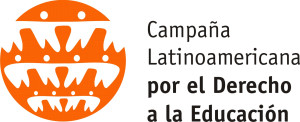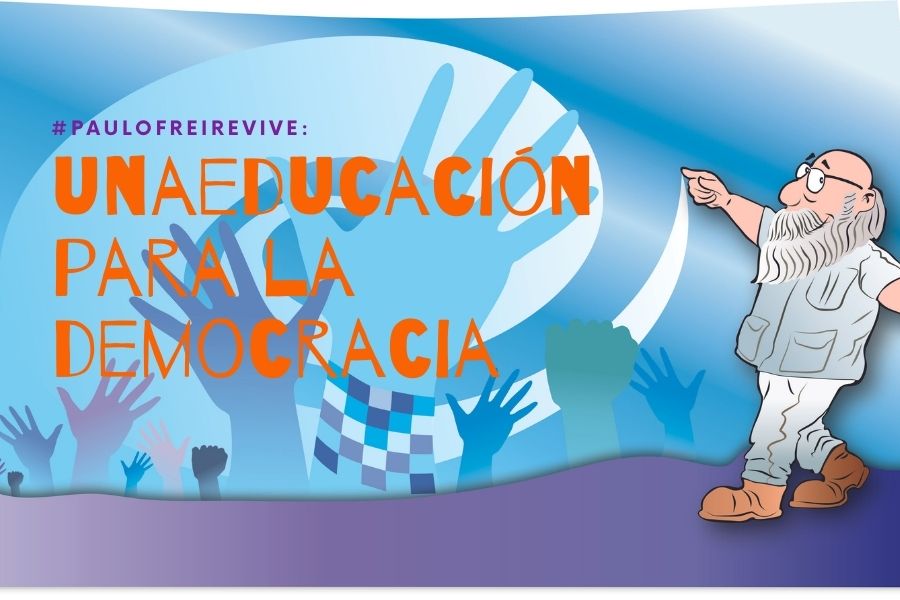
Paulo Freire´s Centenary: his legacy as educator is vital for strengthening Y&AE for democracy
September 1, 2021During September, the Latin American Campaign for the Right to Education (CLADE) developed a campaign through communication, awareness and dialogue activities in order to remember the importance of the legacy of the Brazilian educator Paulo Freire and reaffirm our option and struggle for a liberating education that strengthens democracy and promotes social transformation, towards a more just, equitable, sustainable and peaceful world.
CLADE is a plural network of civil society organizations, with presence in 18 Latin American and Caribbean countries and, from its founding moment, has assumed the thought and pedagogy of Paulo Freire as one of its main principles for the struggle for the human right to education in the region.
Emancipatory education, critical thinking, the transformation of educational environments and relationships into spaces for the collective construction of knowledge, reading of contexts, search for alternatives and transforming actions within the horizon of democracy, have been at the core of CLADE’s strategic work.
Within this framework and having in mind the centenary of Paulo Freire, celebrated on September 19, CLADE, articulated with the Latin American and Caribbean Campaign in Defense of Paulo Freire’s Legacy, organized by the Council for Popular Education in Latin America and the Caribbean (CEAAL), developed a month of communication, awareness and dialogue actions, to recall the importance of Freire’s legacy for the guarantee of an emancipating and critical education, which strengthens democracies in our continent and around the world.
Each week of the month, starting on September 3, CLADE members conducted and disseminated webinars, messages and materials in various formats shared through social media and other channels, as well as interviews and conferences, in order to highlight different concepts related to Freire’s legacy for the realization of an emancipatory and democratic education.
The last week of the campaign, from September 25 to 30, highlighted activities and messages about Freire’s legacy for the guarantee of Youth and Adult Education (Y&AE) as a key fundamental human right to promote sustainable development, human rights and, with them, our democracies.
In this framework, the Platform of Regional Networks for Youth and Adult Education in Latin America and the Caribbean, of which CLADE is a member, together with the Latin American Association of Popular Education and Communication (ALER), CEAAL, the International Federation Fe y Alegría (FIFyA), the Network of Popular Education Among Women in Latin America and the Caribbean (REPEM) and the International Council for Adult Education (ICAE), with the sponsorship of DVV International and Open Society Foundations, held a webinar on September 30, from 17h to 19h (Brazil time, GMT-3), to take up, disseminate and discuss the struggles, demands and proposals of the subjects and activists of Y&AE in Latin America and the Caribbean, on the way to the International Conference on Adult Education (Confintea) VII, which will take place in 2022 in Morocco.
The event, addressed, among other aspects, the importance of Freire’s legacy for the guarantee of Y&AE as a human right, popular and transformative education in the Freirean perspective and the situation of Youth and Adult Education in Latin America and the Caribbean in the context of pandemic.
See below de record of this event in English:
Freire’s contributions to Y&AE: towards sustainable development and social and environmental justice
Inspired by Paulo Freire’s perspectives and teachings, and with Confintea VII on the horizon, members of the Regional Networking Platform for Y&AE in Latin America and the Caribbean advocate for a new Y&AE, which should be popular, free, secular, inclusive, emancipatory and transformative. An education that shouldn’t have colonial, sexist, patriarchal and racist features.
In front of welfare and remedial approach that is usually given to Y&AE, we defend that this educational modality must be of quality, with cultural and social relevance. In front of onslaught of tendencies that attempt to privatize education, the right to Y&AE must be guaranteed free of charge. Their homogenizing vision must be overcome with the conception of Y&AE based on the valuation and exercise of education in its multiple expressions. From this point of view, Y&AE not only has a high educational value, but is also a commitment to the transformation of reality, to the change of social structures. Faced with different forms of discrimination and exclusion of a structural nature, this educational modality must contribute to lay the foundations for our societies, which shouldn´t be colonial, patriarchal and racist.
In times in which the motivations for continuing studies, mainly of people over 15 years of age, have been transformed and go far beyond the fulfillment of academic training needs, the priority of Y&AE should be community, permanent and popular education because it is carried out with and in all areas where human beings develop their activities. Furthermore, it takes community processes as the basis for educational objectives and is committed to the process of popular movements and the overcoming of all forms of oppression. Thus, Y&AE should stop concentrating on formal education and give priority to non-formal and popular education, promoting the social construction of knowledge in communities that foster intercultural, intergenerational and intersectoral encounters.
From this perspective, which is in line with Freire’s thought, the new understandings of Y&AE are based on conceiving human beings as subjects of education capable of producing the urgent and necessary changes for the construction of a more just and sustainable society.
For these reasons, and in compliance with the principles of lifelong education, governments should recognize education throughout life and for the diversity of the population as a human right, guaranteeing its full functioning through public policies, institutions and pertinent resources. Literacy, being the basis for the continuity and completion of studies, mainly of the sectors with higher levels of vulnerability, in current times, requires a broad and diverse vision and educational offer that guarantees the continuity of studies at all levels and areas of the educational systems, overcoming the traditional basic literacy approaches, recognizing learning developed in daily life and developing educational processes from the culture and mother tongue.
On the other hand, assuming the challenges of the current context of multiple crises and the effects of COVID-19 pandemic on the daily life of humanity, we propose to rethink an Y&AE whose principles should be the following: education to create harmonious relationships among human beings, community and mother earth, to enjoy health with integral well-being, and to contribute to develop a resilient society, which preserves the existence of all living beings; a liberating and transforming Y&AE, as part of social and popular movements and as a political-educational strategy and project, in such a way that people and communities become active subjects of the required transformations of the planet; education for the construction of a society free of all kind of discrimination, inequality and exclusion; a community and democratic Y&AE, for coexistence, participatory democracy and socio-community participation; an education based on social justice and political, social, cultural, economic and environmental rights of individuals, peoples and nature.
In other words, we defend an education and Y&AE for the encounter among cultures, that overcomes inequalities derived from colonialism, for intercultural dialogue and revaluation of collective knowledge. Based on Freire’s legacy, the transformative education we need, to build the world we want, is one that guarantees the right to know and the accumulated knowledge of humanity and science, with its use for the benefit of all people, from critical pedagogies and cultural dialogue for global citizenship, the defense of rights, peace, common goods and the care of our common home.
>> Read more in our regional statement towards Confintea VII (available in Spanish).

ASPBAE Statement of Solidarity with members and people of Myanmar
February 12, 2021The Asia South Pacific Association for Basic and Adult Education (ASPBAE) stands in solidarity with its members in Myanmar, the Thinking Classroom Foundation and Equality Myanmar, in their resistance to and condemnation of the coup d’etat staged by the Myanmar military on 1 February 2021 which deposed the country’s democratically-elected leaders and subjected the country into a year-long state of emergency in flagrant disrespect of democratic
processes.
The coup averted the convening of the newly-elected Parliament which would have had a stronger presence of the National League for Democracy (NLD). The NLD won a landslide victory in the November 2020 elections, which the military claimed was marred by widespread fraud despite the country’s independent election commission having certified the results and international election observers having deemed the process to have been free and fair.
This brazen act of disregard for democratic principles and human rights by the Myanmar military breaks the tenuous transition to civilian rule started in 2011, after decades of an authoritarian military rule. It also comes at an already difficult time for people in the country reeling under the unprecedented adverse impacts of the COVID-19 pandemic on their health, income, access to food, jobs and over-all well-being.
President Win Myint, State Counsellor Aung San Suu Kyi and hundreds of other political leaders, activists, students and journalists have since been arrested and deprived of their civil liberties. Strategic means of communications were shut down. A number of development workers were also cut off from their organizational headquarters outside the country, sowing an overall feeling of insecurity despite the critical role they play in supporting the country.
In the days following the military coup however, civilian protests and resistance emerged – a sign of hope and affirmation that the people of Myanmar are defying illegitimate military rule. Teachers and labour unions, youth and student groups organized peaceful demonstrations and many have participated in acts of civil disobedience. Civil servants walked out of their work, people in their homes banged pots and pans as a sign of protest, and citizens organised online resistance to the coup – urging everyone, within and outside the country to resist the military regime and defend democracy and human rights at all costs.
We in ASPBAE stand by our civil society members and partners in the country in their fight for democracy and human rights. As a regional network of more than 200 civil society organisations and individuals operating in around 30 countries of the Asia-Pacific, ASPBAE’s core beliefs are founded on the sanctity of human rights and democratic freedoms of the people. Further, through their right to transformative and liberating education and lifelong learning, the people should be empowered with the essential means to combat poverty, fight all forms of discrimination and
authoritarianism, build a culture of peace and enable them to actively participate in development and governance.
We therefore call on our members, partners and the international community to use their voices and influence to:
1. Stand in solidarity with the people of Myanmar and support all forms of solidarity actions that amplify the calls to restore democracy, human rights and people’s well- being in the country.
2. Pressure the Myanmar military to end its unlawful seizure of power and immediately restore democracy and civilian rule in the country by upholding the results of November 2020 elections
3. Demand the immediate release of all detained leaders, activists, students and journalists by dropping all false charges against them and restore their civil liberties
4. Resist any effort by the military to impede or prevent the flow of support services delivered by local, national and international organisations especially to the most marginalised sectors – women and girls, children, ethnic minority groups, people with disabilities, those from the poor communities, the people affected by protracted civil wars in the various parts of the country, and those who continue to suffer from the impact of COVID-19 pandemic
5. Support and stand united with teachers and students who continue to join the efforts of the people and grassroots organisations in conducting various forms of resistance to challenge the military takeover of power ASPBAE is committed to advancing democratic freedoms and human rights for all.
May courage and solidarity sustain the people of Myanmar and all who fight for the restoration of democracy.
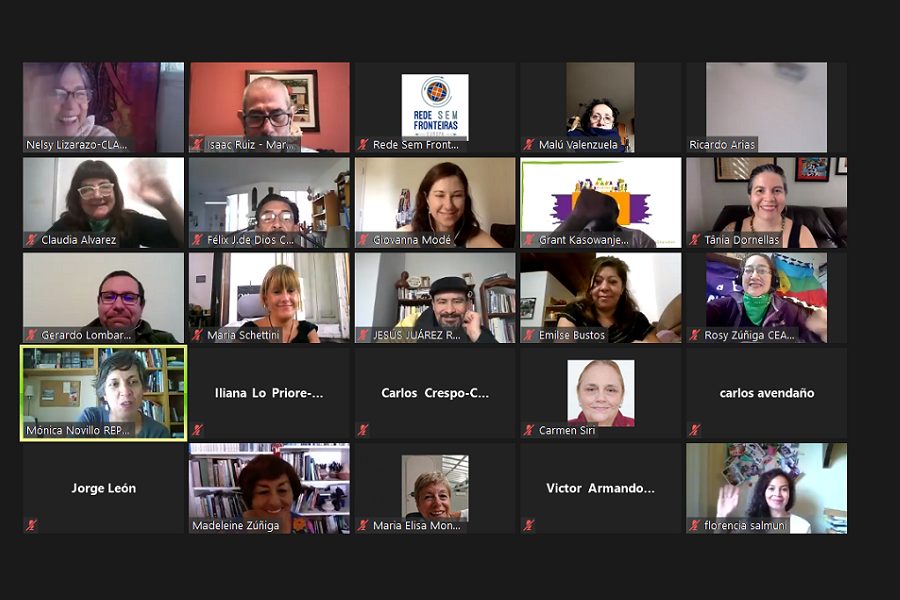
The Assembly “Towards a global agenda: the human right to education from the movements” took place at the World Social Forum 2021.
February 1, 2021With the participation of a hundred delegates from organizations that converge around education as a human right, the self-organized assembly “Towards a global agenda: the human right to education from the movements” was held this Saturday (30) in the framework of the World Social Forum (WSF) 2021.
The activity was organized by the Latin American Campaign for the Right to Education (CLADE), the Council for Popular Education in Latin America and the Caribbean (CEAAL), the Pressenza Agency, the Espacio sin Fronteras Network, the Global March against Child Labour, the Global/Local Network for Quality Education, the Popular Education Network of Women (REPEM), the World Organization for Early Childhood Education (Omep) and Fe y Alegría.
Opening the dialogue, Grant Kasowanjete, Global Coordinator of the Global Campaign for Education, highlighted the need to ensure increased funding for public education in the countries of the global South as one of the main challenges to realizing the human right to education.
She pointed out that “for every dollar of aid that arrives from the global North, ten dollars are taken away through foreign debt and other mechanisms”, which erodes public coffers and underfunds the system, since 90% of education budgets come from own resources.
Nelsy Lizarazo, from the general coordination of CLADE, emphasized the deepening as result of the pandemic, of pre-existing inequality gaps and a refinement of stratification and exclusion from the educational pathway in social sectors lacking support, connectivity or adequate equipment, highlighting rural populations, migrants, indigenous people and people with disabilities, among others.
At the same time, she indicated how governments have handed over millions of dollars and data to corporations, information that will feed the already enormous business of these technology multinationals. She also added that the emergency has meant a greater precariousness of the teaching condition with budget reductions, salary reductions, a heavier workload, to which is added the psychological pressure produced by the effort of educators to respond to and overcome the difficulties posed by the technological and pedagogical challenge of distance education.
On the basis of these characterizations, the question of the learning, strengths and challenges identified in this course was launched as a trigger.
In a first round of interventions, key aspects such as the lack of infrastructure and the need for community technological development independent of large corporate platforms, the damage caused by the exclusion of millions of children from the educational process or the dysfunctionality of homogeneous educational planning in the face of the complexity of diverse realities were pointed out.
Among the lessons learned, the imaginative capacity of the educators who managed to overcome adverse conditions, the propensity for knowledge of children beyond the institutional framework, the importance of dialogue and joint work between school, parents and community, the role of community education together with the favorable impact of progressive political projects in the face of the failure of the neoliberal system were valued.
The assembly continued its collective reflection on the priority agenda of the regions and what is common to these agendas.
In a fluid and propositional dialogue, the participants indicated that the struggle must lead first and foremost, in the face of the prevailing violence in different territories, to guaranteeing the right to life. Likewise, to overcome inequality at educational levels within the social system, to offer safe educational spaces, free of aggression and abuse for girls and boys, and to strengthen a new non-predatory social relationship.
The need to promote a political-pedagogical revolution in the face of neoliberal agendas was also pointed out, as well as the need to strengthen intergenerational dialogue, especially in relation to older adults and the importance of implementing Comprehensive Sex Education as a mechanism to overcome sexual violence against girls, adolescents and women in general.
On the other hand, global priorities included the struggle to ensure that the right to education is not minimized, the defense and strengthening of the public system and counteracting the fallacy that private systems are better, overcoming inequality and discrimination in education, and guaranteeing adequate funding for education from a human rights perspective.
When analyzing possible cross-cutting themes for common action, the indivisibility of human rights was emphasized and, consequently, it was proposed to promote broad alliances by interweaving struggles with the agendas of other rights while contributing to strengthening social organization and mobilization. The importance of continuing to generate knowledge by connecting it with messages and campaigns that mobilise demands was highlighted.
In the same way, a suggestion was made in the debate for a greater exchange on the modalities used to make good practices visible and to achieve effective impact in relation to the demands put forward.
Among the proposals for joint action, the creation of an observatory, the promotion of liberating education in the presence of Paulo Freire’s centenary, the opening of spaces for the expression of the new generations and the idea of Good Living were suggested. Political action is needed to rethink education in terms of feminism and socio-economic equity, and to articulate the forces to overcome not only the physical but also the mental illness from which humanity suffers.
Finally, the Assembly approved a text to be proposed and included in the final declaration of the World Social Forum 2021.
“In the framework of this WSF 2021, we join the agenda of transformation at the global level, articulated to the various fields of social struggle and rights, recognizing the catalytic role of education. The pandemic highlighted the historical inequalities within and outside education systems, affecting women, girls, people with disabilities, refugees and migrants, indigenous communities, rural populations, among others. It also highlighted the digital divide and government responses to it, as well as the need to build a digital sovereignty strategy.
Through strengthened public education systems, it is necessary to resist the threats of fiscal austerity policies, national indebtedness and cuts in education funding, as well as the multiple trends of privatization. From early childhood through to youth and guaranteeing adult education, it is essential, in the post-pandemic period, to rethink the meaning and purpose of education, in the search for the rights of peoples and overcoming patriarchy. A heterogeneous and intercultural model, transformative and inclusive; based on dialogue and safe for communities; valuing their knowledge and local knowledge, as well as collaboration in solidarity and commitment to the protection of life”.
Video:
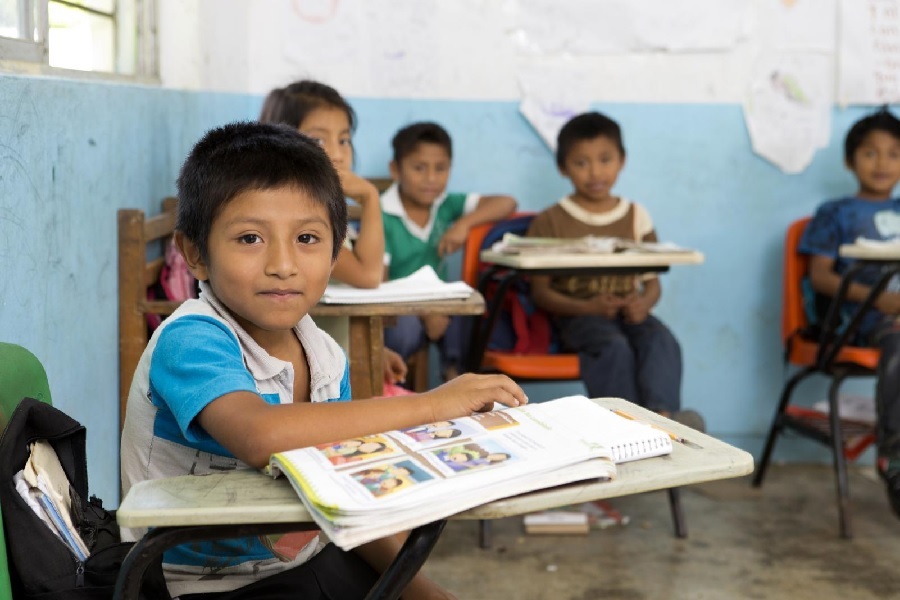
CLADE and CLACSO are promoting a webinar on the Right to Education from a Global South perspective
September 15, 2020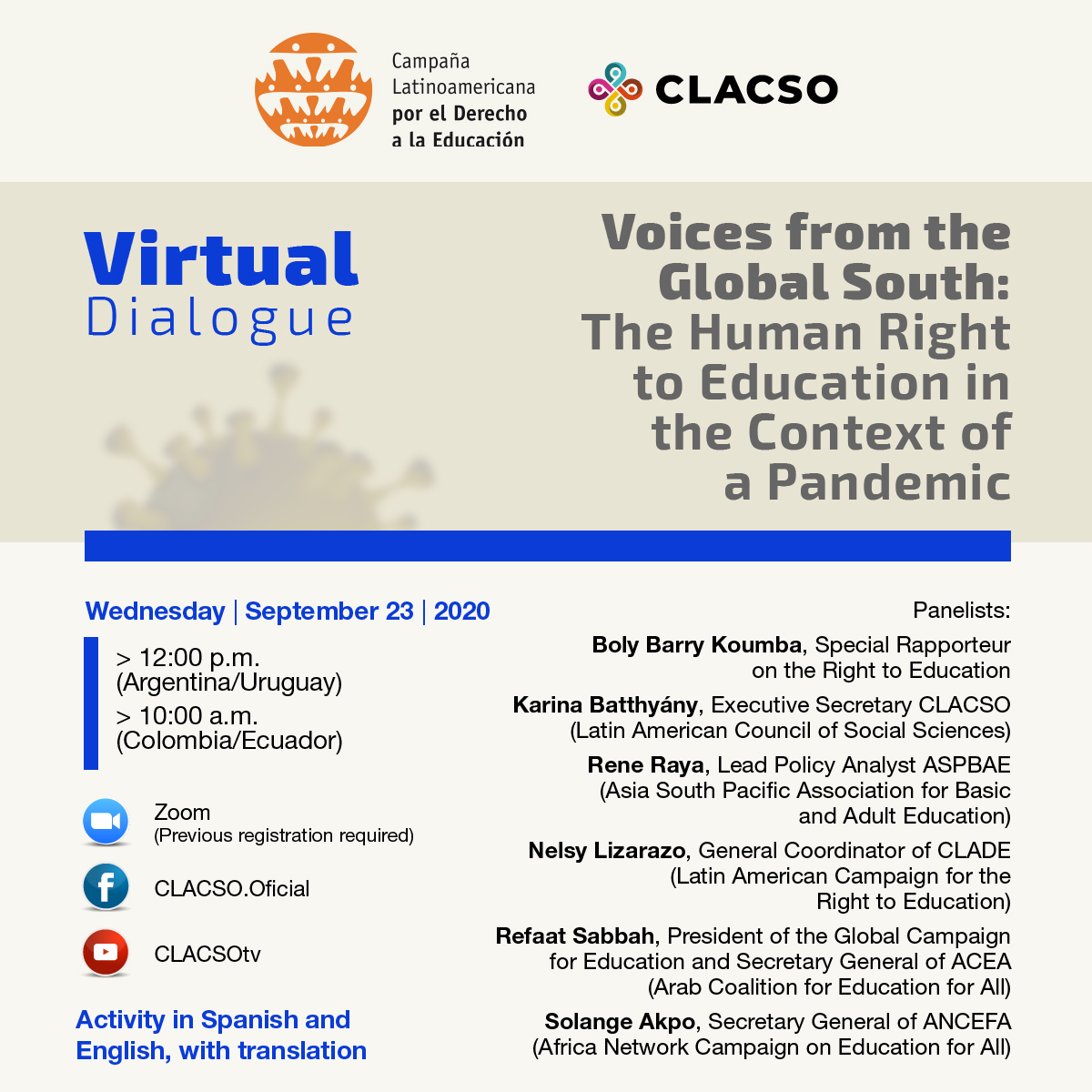 On September 23, at 12:00 p.m. (GMT-3), the Latin American Campaign for the Right to Education (CLADE, by its Spanish acronym) and the Latin American Council of Social Sciences (CLACSO, by its Spanish acronym) will organize a virtual dialogue “Voices from the Global South: The Human Right to Education in the Context of a Pandemic.”
On September 23, at 12:00 p.m. (GMT-3), the Latin American Campaign for the Right to Education (CLADE, by its Spanish acronym) and the Latin American Council of Social Sciences (CLACSO, by its Spanish acronym) will organize a virtual dialogue “Voices from the Global South: The Human Right to Education in the Context of a Pandemic.”
The objective of this gathering is to analyze, reflect and debate on the human right to education in the context of a pandemic, and from a Global South perspective. United Nations (UN) Special Rapporteur for the Right to Education, Boly Barry Koumba will participate in this event. Joining the Special Rapporteur will be CLACSO Executive Secretary, Karina Batthyány; CLADE General Coordinator, Nelsy Lizarazo; the President of the Global Campaign for Education (GCE) and Secretary General of the Arab Coalition for Education for All, Refaat Sabbah; the Lead Policy Analyst of the Asian South Pacific Association for Basic and Adult Education (ASPBAE), Rene Raya; and the Secretary General of the African Network Campaign on Education for All (ANCEFA), Solange Akpo.
The activity is open, free and will be broadcasted through CLACSO Facebook page, Youtube and Zoom. The webinar will be conducted with Spanish-English simultaneous translation. Previous registration here is required for Zoom participation.
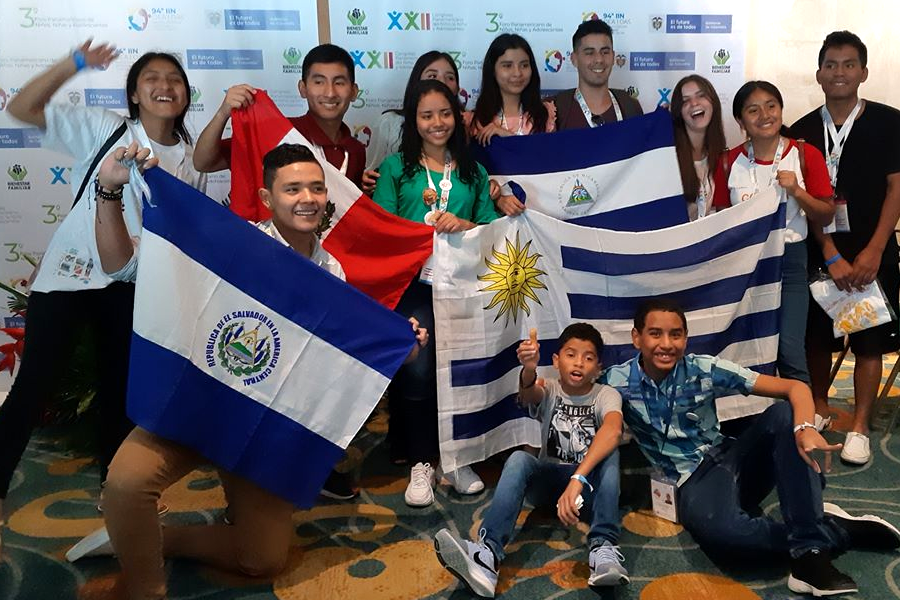
Pan-American Congress analyzes the advances and challenges for achieving the rights of boys, girls and adolescents
May 20, 2020Overcoming discrimination and violence, the right to play, art and recreation, gender equality and the right to comprehensive sexuality education and to participate in the debates on public policies affecting them: these were some of the demands shared by boys, girls, adolescents and youths during the 22nd Pan-American Child and Adolescent Congress and the Third Pan-American Child Forum that were held from Oct. 29-31 in Cartagena (Colombia).
(more…)
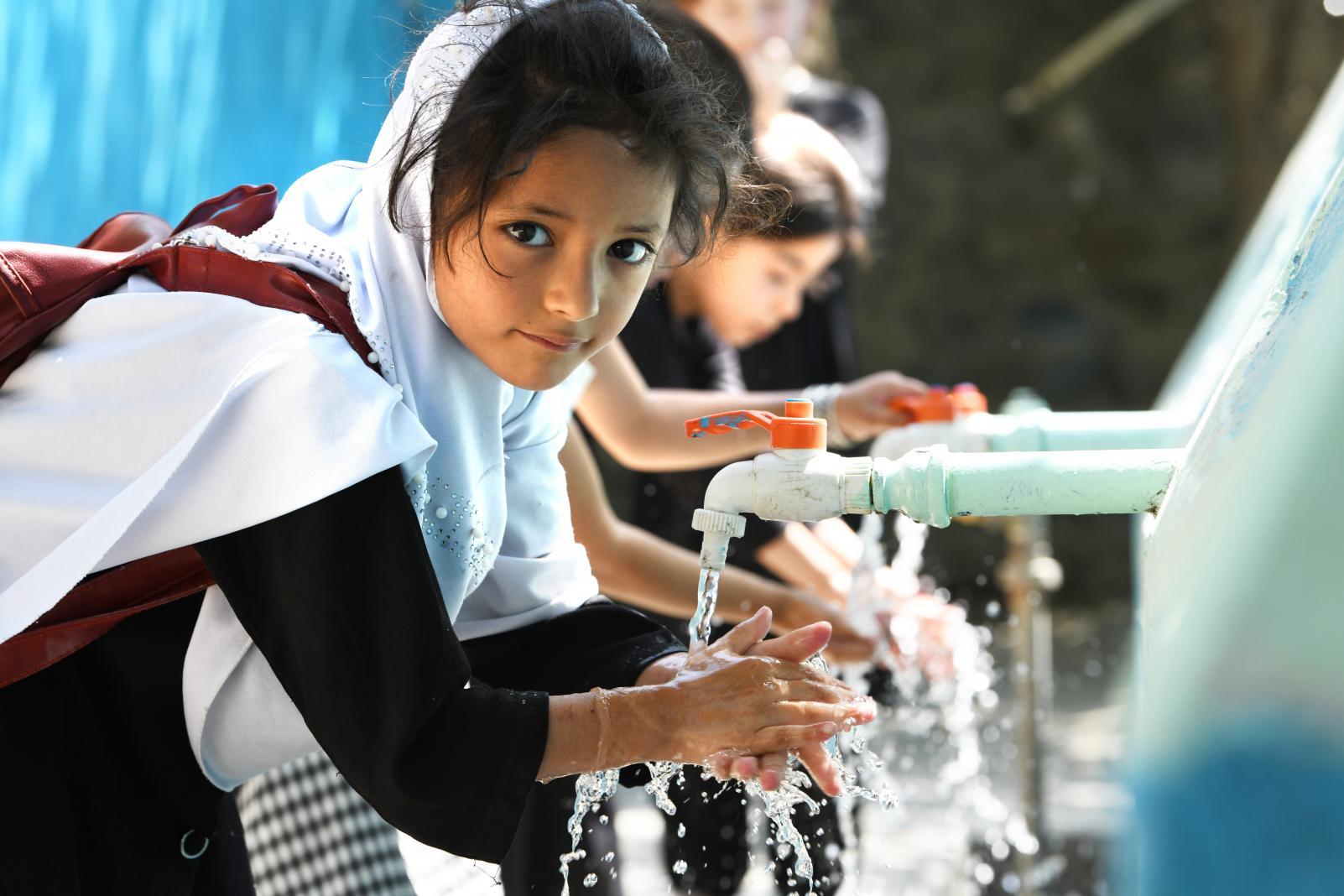
COVID-19: CLADE considers that solidarity and adequate funding for the rights to education, health, and social protection are key to overcome the crisis
March 25, 2020Considering the widespread crisis and state of emergency across the world due to the COVID-19 pandemia, CLADE acknowledges and appreciates the life and health prevention and care recommendations made by the World Health Organization. We would like to express our solidarity with families that have lost their loved ones due to the virus, as well as survivors and sick people. Likewise, we would like to congratulate CLADE members, as well as so many human rights organizations and movements across Latin America and the Caribbean, for promoting several initiatives to ensure the protection of education communities and their human rights. We would like to express our heartfelt thanks to health workers, as well as workers in other key areas who put their lives at risk to provide essential services. (more…)
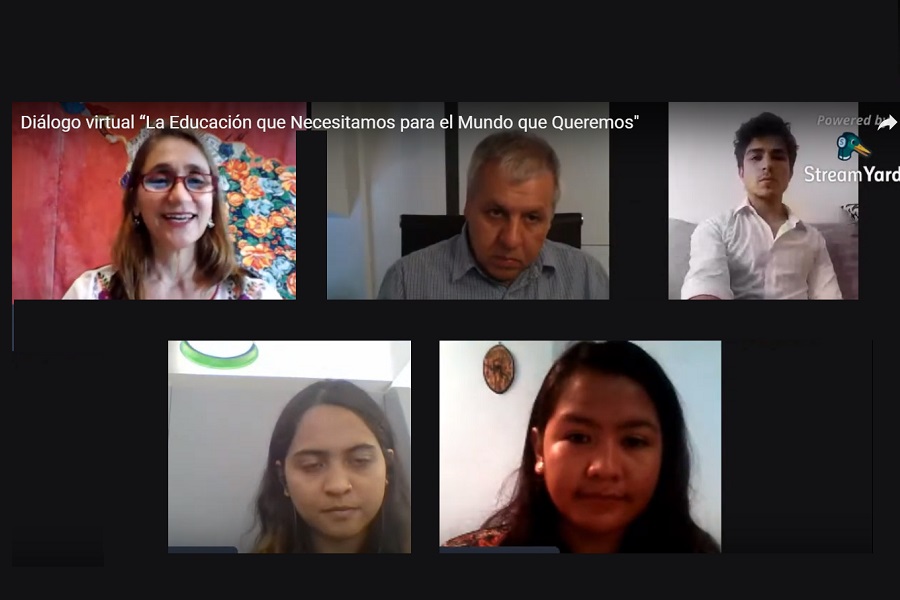
Experts and youths talk about the right to education in Latin America and the Caribbean
March 16, 2020“The Education We Need for the World We Want: views from adolescents and youths in Latin America and the Caribbean” was the title of the virtual conversation held by the Latin American Campaign for the Right to Education (CLADE), with the participation of youths and authorities from Latin America and the Caribbean, who stressed challenges and proposals to ensure the right to education in this region.
(more…)
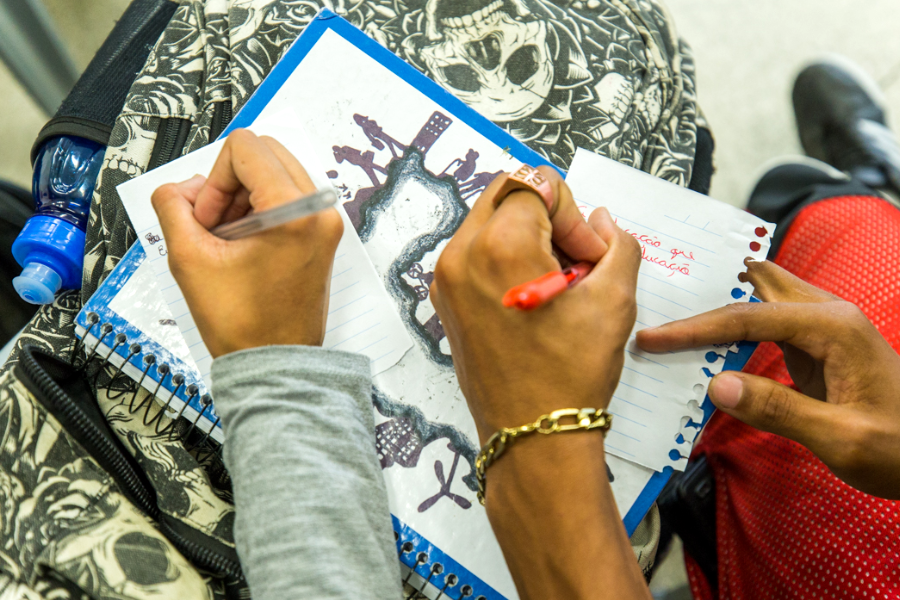
Adolescents and youths share their views on the education they want for a better world
December 19, 2019The initiative #TheEducationWeNeed for the world we want is aimed at mobilizing adolescents and youths in Latin America and the Caribbean, inviting them to tell us what education they need for a better world and the most important demands from their countries.
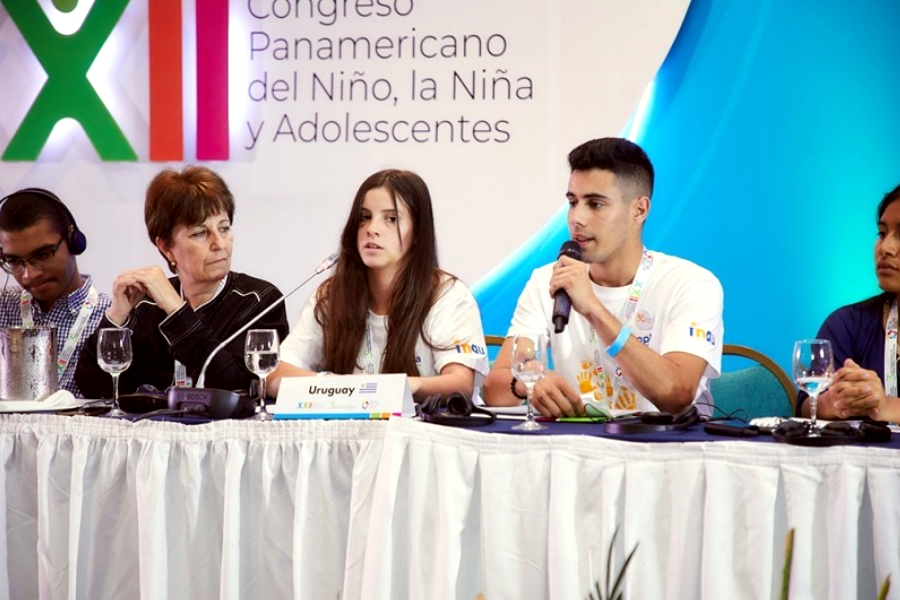
What are Latin America and Caribbean students’ thoughts on education and other human rights?
November 11, 2019Overcoming discrimination and violence, the right to play, art and recreation, gender equality and the right to comprehensive sexuality education and to participate in the debates on public policies affecting them: these were some of the demands shared by boys, girls, adolescents and youths during the 22nd Pan-American Child Congress and the Third Pan-American Child Forum that were held from Oct. 29-31 in Cartagena (Colombia).
(more…)
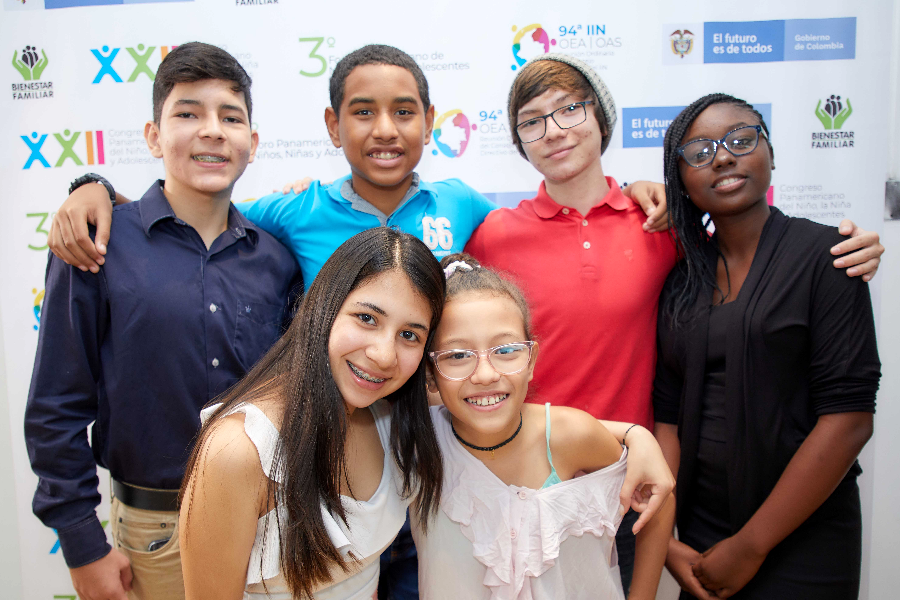
“The Convention is a moral universal instrument against injustice to which girls and boys in the world were subjected”
November 7, 2019Close to the 30th anniversary of the Convention on the Rights of the Child (CRC) to be celebrated on November 20, the president of the Committee on the Rights of the Child, which is responsible for monitoring this treaty, Luis Ernesto Pedernera; and the rapporteur on the rights of the child and president of the Inter-American Commission on Human Rights (CIDH), Esmeralda Arosemena de Troitiño, presented some thoughts on the advances and challenges for the implementation of the Convention.
(more…)





